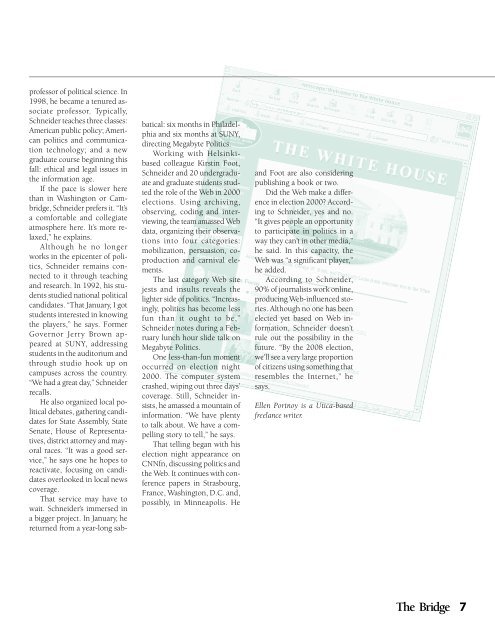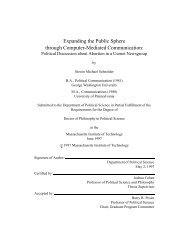Bridge (Spring 2001) - SUNY Institute of Technology
Bridge (Spring 2001) - SUNY Institute of Technology
Bridge (Spring 2001) - SUNY Institute of Technology
You also want an ePaper? Increase the reach of your titles
YUMPU automatically turns print PDFs into web optimized ePapers that Google loves.
pr<strong>of</strong>essor <strong>of</strong> political science. In<br />
1998, he became a tenured associate<br />
pr<strong>of</strong>essor. Typically,<br />
Schneider teaches three classes:<br />
American public policy; American<br />
politics and communication<br />
technology; and a new<br />
graduate course beginning this<br />
fall: ethical and legal issues in<br />
the information age.<br />
If the pace is slower here<br />
than in Washington or Cambridge,<br />
Schneider prefers it. “It’s<br />
a comfortable and collegiate<br />
atmosphere here. It’s more relaxed,”<br />
he explains.<br />
Although he no longer<br />
works in the epicenter <strong>of</strong> politics,<br />
Schneider remains connected<br />
to it through teaching<br />
and research. In 1992, his students<br />
studied national political<br />
candidates. “That January, I got<br />
students interested in knowing<br />
the players,” he says. Former<br />
Governor Jerry Brown appeared<br />
at <strong>SUNY</strong>, addressing<br />
students in the auditorium and<br />
through studio hook up on<br />
campuses across the country.<br />
“We had a great day,” Schneider<br />
recalls.<br />
He also organized local political<br />
debates, gathering candidates<br />
for State Assembly, State<br />
Senate, House <strong>of</strong> Representatives,<br />
district attorney and mayoral<br />
races. “It was a good service,”<br />
he says one he hopes to<br />
reactivate, focusing on candidates<br />
overlooked in local news<br />
coverage.<br />
That service may have to<br />
wait. Schneider’s immersed in<br />
a bigger project. In January, he<br />
returned from a year-long sabbatical:<br />
six months in Philadelphia<br />
and six months at <strong>SUNY</strong>,<br />
directing Megabyte Politics.<br />
Working with Helsinkibased<br />
colleague Kirstin Foot,<br />
Schneider and 20 undergraduate<br />
and graduate students studied<br />
the role <strong>of</strong> the Web in 2000<br />
elections. Using archiving,<br />
observing, coding and interviewing,<br />
the team amassed Web<br />
data, organizing their observations<br />
into four categories:<br />
mobilization, persuasion, coproduction<br />
and carnival elements.<br />
The last category Web site<br />
jests and insults reveals the<br />
lighter side <strong>of</strong> politics. “Increasingly,<br />
politics has become less<br />
fun than it ought to be,”<br />
Schneider notes during a February<br />
lunch hour slide talk on<br />
Megabyte Politics.<br />
One less-than-fun moment<br />
occurred on election night<br />
2000. The computer system<br />
crashed, wiping out three days’<br />
coverage. Still, Schneider insists,<br />
he amassed a mountain <strong>of</strong><br />
information. “We have plenty<br />
to talk about. We have a compelling<br />
story to tell,” he says.<br />
That telling began with his<br />
election night appearance on<br />
CNNfn, discussing politics and<br />
the Web. It continues with conference<br />
papers in Strasbourg,<br />
France, Washington, D.C. and,<br />
possibly, in Minneapolis. He<br />
and Foot are also considering<br />
publishing a book or two.<br />
Did the Web make a difference<br />
in election 2000? According<br />
to Schneider, yes and no.<br />
“It gives people an opportunity<br />
to participate in politics in a<br />
way they can’t in other media,”<br />
he said. In this capacity, the<br />
Web was “a significant player,”<br />
he added.<br />
According to Schneider,<br />
90% <strong>of</strong> journalists work online,<br />
producing Web-influenced stories.<br />
Although no one has been<br />
elected yet based on Web information,<br />
Schneider doesn’t<br />
rule out the possibility in the<br />
future. “By the 2008 election,<br />
we’ll see a very large proportion<br />
<strong>of</strong> citizens using something that<br />
resembles the Internet,” he<br />
says.<br />
Ellen Portnoy is a Utica-based<br />
freelance writer.<br />
The <strong>Bridge</strong> 7
















